Victory Lap!
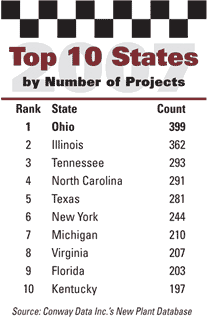

his time around, Gov. Ted Strickland and his economic development team are only too eager to celebrate Ohio’s winning Site Selection‘s coveted Governor’s Cup. Ohio won the 2006 Cup, as well, but the Strickland Administration in March 2007 was so new to the governor’s office that credit for that win went to the previous administration’s economic development team. The Governor’s Cup goes to the state with the most new or expanded capital projects the previous year as tracked by Site Selection publisher Conway Data Inc.’s New Plant database.
As for his contribution to this year’s win, says Gov. Strickland, “I am as engaged as my development leadership wants me to be, which may involve travel, phone calls or personal meetings – anything they feel will be helpful.” And it is that development team, headed by Lt. Gov. Lee Fisher, he notes, that deserves the credit for executing Strickland’s vision of making Ohio a pro-business, low-cost location in which to grow industry.
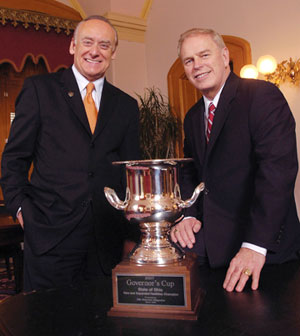
While Fisher and the many local and regional economic development officials around the state are the foot soldiers in the trenches, Strickland says his role is to set the record straight with respect to Ohio’s strengths, especially in challenging economic times.
“Ohio has been described by some as a ‘flyover state,’ but people who understand all that we have to offer see it as a desirable place to be,” he notes, pointing to the state’s diverse work force, reasonable cost of living, physical and transportation infrastructure, health care and higher-education resources and location ideally suited for distribution and logistics operations.
“The fact that tax reform was passed by a Republican governor and legislature and is now embraced by a Democratic governor says there is predictability and stability in terms of our business climate,” says Strickland. “We are emphasizing education and work-force training and development in Ohio in a huge way. I have frozen college tuition in the state for the next two years, and we are putting $100 million into a grant program to enable capable students to pursue careers in science and technology,” he adds. “And we are in the midst of a major push to make Ohio a leader among the states in terms of quality of education and to make college more accessible.”
From his vantage point, says Strickland, “Economic development is likely to occur where there is a positive business climate in terms of taxation, an emphasis on education at every level, including work-force development, and where the corporate and political interests are working together to make Ohio attractive. I hope 2008 is a year in which we continue to compete strongly and that we are having this discussion a year from now with yet another Governor’s Cup.”
Central to that effort will be Lt. Gov. Lee Fisher, Strickland’s chief economic development deputy and head of the Ohio Dept. of Development (www.odod.state.oh.us). More than any other factor, Fisher credits the governor with Ohio’s latest Governor’s Cup.
“He has made economic development the top priority of his administration,” says Fisher. “He has sent a clear signal to every cabinet department that although there is only one Department of Development, every cabinet department must have as part of its central mission to promote and accelerate economic growth in our state,
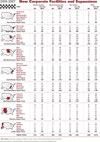
Facilities and Expansions
Click the above thumbnail image to view the complete chart (183k pdf).
so we are all working to one single purpose and mission.
“Second, we have created a new sense of urgency and rapid outreach and response in the Department of Development by aggressively reaching out to companies in the state and doing everything we can to partner with them quickly and responsively to meet their short-term and long-term work-force and capital-investment needs,” says Fisher. “As a result, we have had some major successes.”
Third, says Fisher, the state has focused lately on making targeted investments in industry clusters deemed to have the most long-term investment potential. These include biotech, health care, aeropropulsion and power, advanced energy, automotive, distribution and logistics and polymers and plastics, among others.
A fourth factor behind Ohio’s strong performance is its renewed focus on work-force and talent development. “This has not been a priority in Ohio for too many years, and we have elevated its importance and have created a new partnership between the Department of Development and the University System of Ohio and the Ohio Department of Child and Family Services,” he says.
Fisher realizes that not every Ohio industry is in growth mode and that jobs have left Ohio and other states in the region. Nevertheless, sound bites from economists and business pundits don’t tell the whole story.
“The many economic development successes we are having do not reflect themselves immediately in job numbers and statistics, because when we do create new jobs, they are produced usually over a period of 18 to 36 months,” he explains. “I am very optimistic that we will begin to see those reflected in jobs and economic statistics, but maybe not until some time late in 2008 or 2009. But it does not take away from the successes that are in the pipeline.”
At the same time, says Fisher, Ohio is in the midst of aggressively diversifying its economic portfolio. The fruits of that initiative – and the recently enacted tax reform – are just now becoming apparent.
“Manufacturing remains the largest sector of Ohio’s economy, and the new tax system eliminates the state and local taxes that have been the greatest hindrance to capital investment, particularly in manufacturing,” he notes. “When we are competing with other states, we often put a present-day value on the effective reform and then compare that with the other states with which we compete. Repeatedly, we have been able to show businesses that we are a much better value for them, not just when you take into account tax credits, grants and loans, but also the present-day value of Ohio’s tax reform.”
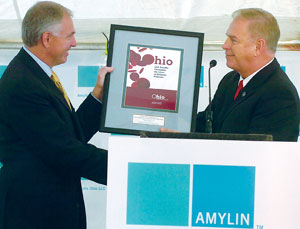
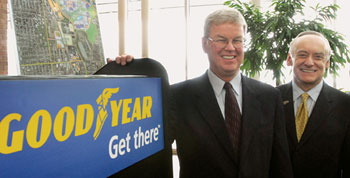
Though not as robust as some states’ “slush funds” used to seal deals, Ohio has put to good use its Economic Development Contingency Fund and a Rapid Outreach Fund to help lure projects to the Buckeye State.
“Although we would like to have more funds in those pools than we have today, we do use them selectively for projects where we believe a quick response is necessary in order to close an important deal,” says Fisher.
Fisher and his economic development colleagues take no project for granted in the race for the Governor’s Cup, but he does allow that certain deals were particularly sweet. These include Amylin Pharmaceuticals‘ $400-million, 500-job investment in a diabetes drug manufacturing facility in West Chester that involved a multi-state competition. “We successfully won that competition despite the fact that our financial-incentive package probably was not the largest. We won because of the cohesive public-private partnership that we created to demonstrate that we could meet Amylin’s work-force and research and development needs by creating a partnership with adult career technical schools, community colleges and universities and our work-force development system.”
Just as meaningful was the retention of Goodyear Tire and Rubber‘s longstanding Akron operations.
“These days, in this global economy, even iconic companies that have long been established in a particular state have the ability and flexibility to move quickly out of state,” Fisher points out. “Goodyear came to us and indicated that a number of states had come to them to convince them to leave Ohio, because they wanted to expand their headquarters. We partnered with them, the City of Akron, the county, the port authority and a private developer to close an $890-million project that retained about 3,000 jobs and will create far more jobs in the future. What was particularly exciting about this is that we partnered with a private developer for a multi-billion-dollar investment that would redevelop the area around the corporate headquarters and create a mixed-use district that would revitalize the City of Akron as well. It’s a great example of leveraging public dollars and bringing in private dollars to go well beyond the immediate corporate expansion project.”
Well before Gov. Strickland and Lt. Gov. Fisher came to Columbus, Ohio racked up a three-year Governor’s Cup sweep – from 1993 to 1995 – and the state also claimed the 2003 prize. With two in a row this year, next year’s race will be more competitive yet, with Ohio wanting a three-peat and lots of other states working to prevent that.
Site Selection Online – The magazine of Corporate Real Estate Strategy and Area Economic Development.
©2008 Conway Data, Inc. All rights reserved. SiteNet data is from many sources and not warranted to be accurate or current.
